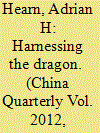| Srl | Item |
| 1 |
ID:
171129


|
|
|
|
|
| Summary/Abstract |
Based on ethnographic fieldwork in China and Georgia, this article traces the origins and describes current practices of post-Soviet tourist trading in Yabaolu Market in Beijing. While traders from across the Caucasus visit Yabaolu, my focus is on Georgian traders who today perceive themselves as biznesmeny. Focusing on a typical trade visit, the article explores the role of ethnic and kinship ties in the organization of this trade. It questions the notion of ethnic entrepreneurship and the idea that ethnic cooperation itself may serve a basis of trust and underpin traders’ activities. Instead, the article illustrates how enduring transnational linkages are built on other forms of reliability and reputation. These are framed in the lexicon of friendship, as well as kinship and pseudo-kinship vocabulary, and facilitate commercial transactions between traders of different ethnic, social and religious backgrounds in an environment where state regulation and legal law enforcement are almost absent.
|
|
|
|
|
|
|
|
|
|
|
|
|
|
|
|
| 2 |
ID:
112504


|
|
|
|
|
| Publication |
2012.
|
| Summary/Abstract |
Chinese communities resident in Mexico and Cuba face a common problem: their dealings with business partners in China are perceived as a threat to national interests. In Mexico this concern emanates from manufacturers unable to compete with Chinese imports, and is evident in antagonistic news media and acts of hostility against Chinese businesses. In Cuba it stems from the state's stewardship over economic sovereignty, and is evident in efforts to assimilate Havana's Chinatown and its entrenched informal sector into a centralized scheme of commercial regulation. Interviews with policy makers, local officials and Chinese entrepreneurs indicate that the "rationalization" of Chinese ethnic allegiances for the greater public good is a critical step towards alleviating tensions. I conclude that both countries can leverage benefits from overseas Chinese communities, but to do so they must support their entrepreneurial activities, harness their networks to promote targeted imports and exports, and develop more culturally sensitive regulations.
|
|
|
|
|
|
|
|
|
|
|
|
|
|
|
|